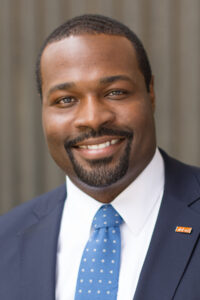
Senior Director, Sourcing Partnerships and Programs, Vizient
The Journal of Healthcare Contracting: What did you learn about yourself and your team over the last year?
Omar Roberson: I learned that I really missed being in a room with my team and using a whiteboard to brainstorm a new idea or project. However, working remotely forced us to use technology in different ways to generate ideas in a group setting. For example, we used a software platform that simulated a Post-it Notes brainstorming session to perform an affinity diagram exercise. We used affinity diagrams to organize a large set of ideas written on Post-it Notes into their natural themes. This exercise went very well even without the team being in the same room.
Additionally, I was amazed at the resilience of our team as they were still able to achieve their savings goals for each of our member hospitals. In the midst of COVID-19, it was an even greater challenge for us to meet our internal operational and financial goals for the year. With determination and teamwork, each goal was attained.
Through the pandemic, I’ve realized the importance of being more intentional with connecting with family, friends and loved ones. I believe that it’s essential to stay connected with the people you love. I cannot truly enjoy success in my career without the foundation of my loving family being secure.
JHC: What project or initiative are you looking forward to working on?
Roberson: We have some very exciting projects in the pipeline with the goal of improving operational efficiency within our organization. These projects are focused on enabling our sourcing executives to obtain speed to value in commodity categories. This allows them to allocate more time on more complex initiatives, such as physician preference items and purchased services that require more effort. The new strategies ask our organization to reconsider how we’re currently structured and to think outside the box regarding how we conduct our bid process. We’re also deploying internal dashboards so each sourcing team can benchmark against their counterparts, which encourages sharing of best practices and allows us all to better serve our members.
JHC: How do you continue to develop yourself as a leader?
Roberson: I’ve recently embraced actively seeking mentors for sound advice about leadership, career advice, business concepts and life in general. Years ago, I was hesitant to seek a mentor, but I’ve realized that most people view it as an honor to be chosen as a mentor and look forward to being a part of someone else’s journey towards success. You also don’t have to limit yourself to one mentor. Multiple mentors are just fine because we live multifaceted, complex lives, and seeking different advice from multiple people can help with furthering one’s leadership development.
JHC: What changes brought about by the pandemic are here to stay?
Roberson: I believe supply chain organizations have obviously re-evaluated their inventory methodologies such as bulk buys or JIT (just-in-time), particularly with PPE products. Additionally, supply issues with allocation and distribution compelled providers to invest in building their own distribution centers to have more control. We also saw the consideration of new suppliers as alternative sources. With that, organizations are including additional information in a supplier’s scorecard like raw material data and the location of manufacturing sites of sub-vendors to better protect themselves.
